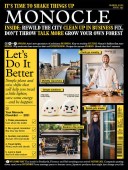
Issue 141
“Do it better” is the theme of Monocle’s March issue, which surveys the firms and folks creating sustainable ways of living and working. We visit the companies rewilding our cities, find the makers focused on repairing our relationship with manufacturing and meet the urbanists imagining greener, healthier places to live and work. With our usual focus on design, diplomacy, architecture and art, our editors have brought together an inspiring read on the world – not to mention some advice for ejecting a moose from your garden.
In This Issue
Oops! No content was found.
Looks like we no longer have content for the page you're on. Perhaps try a search?
Return Home

